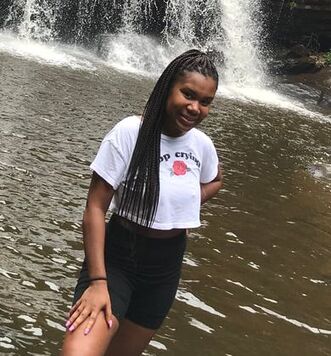Climate Storytelling Workshops
What is a Climate Storytelling Workshop?
 Jordyn Muse, Climate Storytelling Ambassador, Maryland
Jordyn Muse, Climate Storytelling Ambassador, Maryland
It can be difficult to see the connection between climate change and day-to-day activities, attitudes, and experiences. Yet talking about climate change and connecting it to everyday life are critical steps in collectively working towards building a more just and sustainable world.
In a Climate Stories Project workshop, your organization or your students will take these steps and harness the power of storytelling to engage with climate change:
Here are some examples of Climate Storytelling workshops that have been carried out:
In all of these workshops, participants came away with a deeper engagement with climate change as a vital human issue and were better able to understand their own relationship to the changing climate in their home regions. To learn more about workshop pricing and for access to a library of Climate Stories Project workshop documents such as lesson plans, information forms, and helpful tips, please contact us.
In a Climate Stories Project workshop, your organization or your students will take these steps and harness the power of storytelling to engage with climate change:
- Share how climate change has been impacting your own community and communities around the world.
- Have meaningful conversations about these impacts.
- Put human faces to the abstractness of climate change.
- Connect the science of climate change to the stories of people out in the world.
- Create and share creative works that feature climate storytelling.
Here are some examples of Climate Storytelling workshops that have been carried out:
- Members of Massachusetts Audubon Society planned and shared their own climate stories in an online workshop.
- Students in a Public Heath class at the University of Massachusetts, Lowell, planned and conducted interviews about local climate change impacts and how they impact community public heath.
- Students at Common Ground Charter School in New Haven, Connecticut interviewed Inuit students at Shishmaref, Alaska high school about climate impacts there.
- Students at the Adirondack Youth Climate Summit did reflective writing about their emotional responses to climate change and discussed their climate stories with each other.
- Students at Juilliard College of Music crafted their own climate stories and discussed climate storytelling in art and music.
- Students at Paul Smith's College interviewed residents of the Adirondacks and made a short documentary film about climate change in the region.
- Participants from community organizations in Montgomery County, Maryland crafted and shared their own climate stories and interviewed community members about their stories.
In all of these workshops, participants came away with a deeper engagement with climate change as a vital human issue and were better able to understand their own relationship to the changing climate in their home regions. To learn more about workshop pricing and for access to a library of Climate Stories Project workshop documents such as lesson plans, information forms, and helpful tips, please contact us.
The workshop was well presented, and I heard some unique perspectives on climate change. It was great finding out about ways to write climate stories and how personal perspectives can make the effects of climate change more keenly felt. It gave me new ways of thinking about this huge problem, that highlighted people's experiences and feelings. I enjoyed hearing about artistic responses to climate change, both in the form of performance pieces and stories.
- Helena, London UK
- Helena, London UK
Paul Smith's College Environmental Studies Professor Bethany Garretson speaks about Adirondack Climate Stories, for which her students interviewed community members in the Adirondacks and created a short documentary film using the interviews.
Student learning outcomes:
Climate Storytelling workshops are easily adaptable to existing curricula, course goals, and learning outcomes. After participating in a workshop, students will be able to:
Climate Storytelling workshops are easily adaptable to existing curricula, course goals, and learning outcomes. After participating in a workshop, students will be able to:
- Explain how climate change is currently impacting their own communities as well as other communities around the world.
- Interview others about their climate stories.
- Design and create their own projects or presentations to share stories of climate change with wider audiences.
- Reflect on their own relationship to climate change and consider steps that they can take in their own lives to address climate change.
Students in Shishmaref, Alaska speak with elders about climate change.